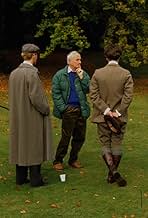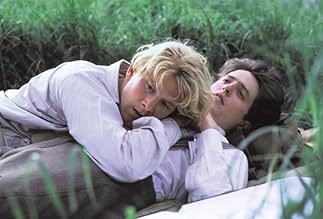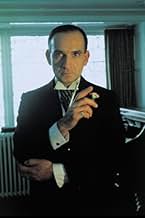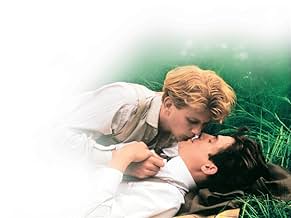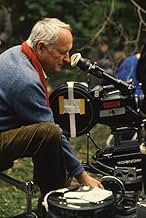IMDb रेटिंग
7.6/10
26 हज़ार
आपकी रेटिंग
अपने प्रेमी द्वारा उसे अस्वीकार करने के बाद, एडवर्डियन समाज की दमनकारीता से फंसा एक युवक आने की कोशिश करता है।अपने प्रेमी द्वारा उसे अस्वीकार करने के बाद, एडवर्डियन समाज की दमनकारीता से फंसा एक युवक आने की कोशिश करता है।अपने प्रेमी द्वारा उसे अस्वीकार करने के बाद, एडवर्डियन समाज की दमनकारीता से फंसा एक युवक आने की कोशिश करता है।
- निर्देशक
- लेखक
- स्टार
- 1 ऑस्कर के लिए नामांकित
- 3 जीत और कुल 2 नामांकन
फ़ीचर्ड समीक्षाएं
A gay classic that is situated at the beginning of the twentieth century. 'Maurice' is the story of Maurice Hall, a student at the University of Cambridge, United Kingdom. There he meets Clive Durham. Both men develop a strong friendship, which to a certain level, becomes physical. Clive is gay, but Maurice doesn't want to know anything about it. Until he admits he also has feelings for persons of the same sex, even though in intellectual circles homosexuality is 'the love that dare not speak its name'.
Maurice doesn't know how to behave. Of course he wants to be himself, but society doesn't accept gay people. When he more or less decides to live as a gay man bosom friend Clive changes his mind, frightened by a lawsuit against a gay man. According to Clive the physical friendship between Maurice and Clive must end and from that moment on he wants to experience real love: the love of a woman. The relation between Maurice and Clive gets tense.
Even Maurice tries to get his sexual preference changed by visiting a hypnotist, but the treatment fails. That becomes very clear when Maurice sleeps with Scudder, Clive's under gamekeeper. A passionate love develops between Scudder and Maurice, which makes Clive realize what kind of appearance he has to keep up as a 'converted' gay man.
'Maurice' is based on the novel of the same name written by E.M. Forster. The film is beautiful and made with a feeling for historical notion. The actors playing the leading roles are straight in real life but act the gay roles in a beautiful way. Actually everything in the film is right: image, usage of language, costumes and music.
Maurice doesn't know how to behave. Of course he wants to be himself, but society doesn't accept gay people. When he more or less decides to live as a gay man bosom friend Clive changes his mind, frightened by a lawsuit against a gay man. According to Clive the physical friendship between Maurice and Clive must end and from that moment on he wants to experience real love: the love of a woman. The relation between Maurice and Clive gets tense.
Even Maurice tries to get his sexual preference changed by visiting a hypnotist, but the treatment fails. That becomes very clear when Maurice sleeps with Scudder, Clive's under gamekeeper. A passionate love develops between Scudder and Maurice, which makes Clive realize what kind of appearance he has to keep up as a 'converted' gay man.
'Maurice' is based on the novel of the same name written by E.M. Forster. The film is beautiful and made with a feeling for historical notion. The actors playing the leading roles are straight in real life but act the gay roles in a beautiful way. Actually everything in the film is right: image, usage of language, costumes and music.
Similar to goldilocks-78, I watched Maurice again - I saw it when I was in my 20s, when it was first released. There is some very good acting, and a very good sociological recreation of the Edwardian period. Maurice, the novel, might well not be considered as EM Forster's finest work. But similar to Lady Chatterley's Lover (not considered among Lawrence's best), the work raises issues of class, gender, and sexuality. The three leads are good - Hugh Grant gives a plausible portrayal of a more refined, upper-class man, who denies his homosexual urgings and marries. He clearly shows (after this conversion of sorts) his ambivalence and almost forced denial. Hugh Grant, almost effortlessly, shows the two sides to this character. James Wilby,as Maurice, moves from self-disgust, despair and guilt, to self-acceptance. Rupert Graves as Scudder (similar to Mellors) is really good. The scenes he shares with James Wilby are not forced. The supporting cast are good - the women, Simon Callow (who introduces us to the Edwardian conformist ideology) are equally good. And Ben Kingsley, as the hypnotherapist nicely shows the push-pull in the then-British psyche. My favourite Merchant-Ivory film is Room with a view. Maurice is darker, but just as well filmed, with enough humour to balance the seriousness of the film. The naive, happily-ever-after ending (EM Forster's) doesn't quite work, but leads to good discussion. Of all the DVD-shown deleted scenes, the final 'confrontation' between Maurice and Durham should be, in my opinion, restored. It's a fine film, both engaging and unsettling. Sensitively adapted, directed, acted and shot. Kudos
Many viewers and critics have criticised the happy ending of this film as being 'unrealistic' or even 'impossible'. After all an upper class and working class man could never live as a couple in Edwardian England? In fact E.M. Forster's inspiration for writing the book Maurice was a real gay couple, one upper class and the other working class, who lived together openly in England for about 35 years until 1928. They are buried in the same grave.
Edward Carpenter was a close friend of E.M.Forster, who named Carpenter's working class gay partner, George Merrill, as the inspiration for his novel Maurice. He had visited Carpenter and Merrill at Millthorpe in Derbyshire on several occasions: once, in 1913, Merrill "touched my backside - gently and just above the buttocks. I believe he touched most people's. The sensation was unusual and I still remember it, as I remember the position of a long vanished tooth. He made a profound impression on me and touched a creative spring" That was the origin for the writing of Maurice.
Edward Carpenter was a close friend of E.M.Forster, who named Carpenter's working class gay partner, George Merrill, as the inspiration for his novel Maurice. He had visited Carpenter and Merrill at Millthorpe in Derbyshire on several occasions: once, in 1913, Merrill "touched my backside - gently and just above the buttocks. I believe he touched most people's. The sensation was unusual and I still remember it, as I remember the position of a long vanished tooth. He made a profound impression on me and touched a creative spring" That was the origin for the writing of Maurice.
"Maurice" (prononced "Morris") is the film adaption of the book by E.M. Forster and stated to be semi-autobiographical of his life. The book was banned for many years and it wasn't until 1987 that this visually splendid film was released from Merchant-Ivory - ("A Room With A View", "Howard's End"). Set in early 19th century England, it details the coming of age story of Maurice Hall, an upper-class aristocrat who falls in love with fellow classmate Clive Durham (Hugh Grant). Shortly after their romance begins, a fellow student is entrapped and imprisoned for soliciting a military officer. Out of fear of losing his inheritance and political future, Clive decides to get married. Although hurt and feeling very alone, Maurice continues a close platonic relationship with Clive. After attempts to "cure" his homosexuality fail, Maurice finds himself falling in love with Clive's gamekeeper, Scudder. With the threat of exposure and blackmail always a real possibility, they must risk everything to build a future together. Supporting performances by Denholm Elliot, Helena Bonham Carter and Ben Kingsley help make this a true classic. The lush and elegant score is available as part a 3-disc set of Merchant-Ivory film scores. Guys, if you're looking for a great "first-date" video, it really doesn't get much better than "Maurice"!
I saw MAURICE when it first appeared in theaters in the mid-80s and enjoyed it. I was surprised on a second viewing on DVD last night at how much I had forgotten about this film. This story of a thwarted love affair between two upper- class men during their years at Cambridge is a deeply absorbing and entertaining adaptation of Forster's posthumously published novel, which I read at in 1971. I thought the book rather dull. The movie seems anything but, which makes me wonder if I shouldn't pull it off my library shelves and give it another go.
Though James Wilby's Maurice Hall is the main character, it is Hugh Grant young aristocrat that is most intriguing here. Clive Durham (Grant) is a spoiled and deeply entrenched member of Britain's snobbish ruling class. It is Durham who pursues Wilby (not the other way around as some of these reviews would have you believe). Initially spooked by Durham's admission of his love for Maurice, he pursues Durham with a naive passion. But that passion is ruined when a fellow classmate from Cambridge is set up by a soldier in a bar and arrested by the police. This young man's future in politics and society is ruined (horrified, Durham says no to him when he asks to testify on his behalf), and he is found guilty and sentenced to six months in jail and hard labor. His picture is splashed across the headlines of London's tabloids. The realization that this could happen to him forces Durham to reject Maurice, pursue and marry a young girl from his class and move himself deeply into the closet. So much for the politics of homosexuality in Britain, circa 1912.
Maurice is devastated by his friend's rejection of him. Miserable, he seeks every avenue he can to reverse and cure his own homosexual longings. He even subjects himself to the quackery of a hypnotist-therapist (Ben Kinsley in a hilarious turn). Maurice finally gives in to his feelings when he finally falls deeply in love with the gamekeeper of Durham's estate (well played by the young and very handsome Rupert Graves).
This Merchant-Ivory film is, typically, gorgeous to look at, its pacing is novelistic and deeply rewarding. Hugh Grant showed early star appeal as the superficial and ultimately defeated victim of his class and society. He would rarely get the chance at so fine a part in the future despite his great success as a light comedian in a string of international hit movies (ABOUT A BOY being one such terrific film performance from this very appealing actor). James Wilby is pitch perfect as the perplexed and emotional Maurice. The expert supporting cast under the commanding direction of James Ivory delivers this period piece superbly. It's period look is typical of Merchant-Ivory productions--detailed, richly appointed and very beautiful. Kudos also to Kit Hesketh-Harvey's excellent screenplay.
One viewer here complained that ending was far too upbeat and unrealistic for its time, but I really didn't see it that way. There were many men and women who set up housekeeping in both London and New York, living their lives in discreet harmony under the noses of hostile societies. Still others preferred to move abroad to live their lives in discrete peace and tranquility. I prefer to think this is just what Maurice and Scudder do. If Maurice were as much of a snob as Durham, this might not have worked. But we see Maurice's slow understanding of the hypocrisy of his class in the aftermath of his affair with Durham, and he comes to realize that even he is somewhat constrained by his own upper-class upbringing in his initial interactions with Scudder's far lower standing.
This is a deeply affecting movie and holds up superbly. Highly recommended.
Though James Wilby's Maurice Hall is the main character, it is Hugh Grant young aristocrat that is most intriguing here. Clive Durham (Grant) is a spoiled and deeply entrenched member of Britain's snobbish ruling class. It is Durham who pursues Wilby (not the other way around as some of these reviews would have you believe). Initially spooked by Durham's admission of his love for Maurice, he pursues Durham with a naive passion. But that passion is ruined when a fellow classmate from Cambridge is set up by a soldier in a bar and arrested by the police. This young man's future in politics and society is ruined (horrified, Durham says no to him when he asks to testify on his behalf), and he is found guilty and sentenced to six months in jail and hard labor. His picture is splashed across the headlines of London's tabloids. The realization that this could happen to him forces Durham to reject Maurice, pursue and marry a young girl from his class and move himself deeply into the closet. So much for the politics of homosexuality in Britain, circa 1912.
Maurice is devastated by his friend's rejection of him. Miserable, he seeks every avenue he can to reverse and cure his own homosexual longings. He even subjects himself to the quackery of a hypnotist-therapist (Ben Kinsley in a hilarious turn). Maurice finally gives in to his feelings when he finally falls deeply in love with the gamekeeper of Durham's estate (well played by the young and very handsome Rupert Graves).
This Merchant-Ivory film is, typically, gorgeous to look at, its pacing is novelistic and deeply rewarding. Hugh Grant showed early star appeal as the superficial and ultimately defeated victim of his class and society. He would rarely get the chance at so fine a part in the future despite his great success as a light comedian in a string of international hit movies (ABOUT A BOY being one such terrific film performance from this very appealing actor). James Wilby is pitch perfect as the perplexed and emotional Maurice. The expert supporting cast under the commanding direction of James Ivory delivers this period piece superbly. It's period look is typical of Merchant-Ivory productions--detailed, richly appointed and very beautiful. Kudos also to Kit Hesketh-Harvey's excellent screenplay.
One viewer here complained that ending was far too upbeat and unrealistic for its time, but I really didn't see it that way. There were many men and women who set up housekeeping in both London and New York, living their lives in discreet harmony under the noses of hostile societies. Still others preferred to move abroad to live their lives in discrete peace and tranquility. I prefer to think this is just what Maurice and Scudder do. If Maurice were as much of a snob as Durham, this might not have worked. But we see Maurice's slow understanding of the hypocrisy of his class in the aftermath of his affair with Durham, and he comes to realize that even he is somewhat constrained by his own upper-class upbringing in his initial interactions with Scudder's far lower standing.
This is a deeply affecting movie and holds up superbly. Highly recommended.
क्या आपको पता है
- ट्रिवियाIn the DVD extras, Hugh Grant says that because he and James Wilby already knew each other from appearing in Privileged (1982) together, they were able to practice their scenes together at Grant's house the night before Wilby's audition. Grant says that he remembers it "being a surprise to my banker brother when he came home and found me kissing James Wilby in the front room."
- गूफ़During one of the earlier scenes while Maurice and others are reading/translating with a professor/dean, Maurice is seen clearly wearing a wristwatch. While wristwatches did exist at the time they were rare, and were considered working class so would not have been worn by a gentleman. The wristwatch would not become common until the first world war, when they were given to soldiers to allow them to see the time while both hands were engaged.
- भाव
Maurice Hall: I'm an unspeakable of the Oscar Wilde sort.
- इसके अलावा अन्य वर्जनSome NTSC versions are scanned at 25fps and the running time is short and seems edited but the movie is intact.
- साउंडट्रैकMiserere Psalm 51
Written by Gregorio Allegri
Sung by The Choir of Kings College Cambridge
Courtesy of The Decca Record Company LTD.
टॉप पसंद
रेटिंग देने के लिए साइन-इन करें और वैयक्तिकृत सुझावों के लिए वॉचलिस्ट करें
- How long is Maurice?Alexa द्वारा संचालित
विवरण
- रिलीज़ की तारीख़
- कंट्री ऑफ़ ओरिजिन
- आधिकारिक साइटें
- भाषा
- इस रूप में भी जाना जाता है
- Moris
- फ़िल्माने की जगहें
- उत्पादन कंपनियां
- IMDbPro पर और कंपनी क्रेडिट देखें
बॉक्स ऑफ़िस
- बजट
- £15,77,000(अनुमानित)
- US और कनाडा में सकल
- $24,84,230
- US और कनाडा में पहले सप्ताह में कुल कमाई
- $49,278
- 20 सित॰ 1987
- दुनिया भर में सकल
- $26,43,324
- चलने की अवधि
- 2 घं 20 मि(140 min)
- ध्वनि मिश्रण
- पक्ष अनुपात
- 1.66 : 1
इस पेज में योगदान दें
किसी बदलाव का सुझाव दें या अनुपलब्ध कॉन्टेंट जोड़ें


